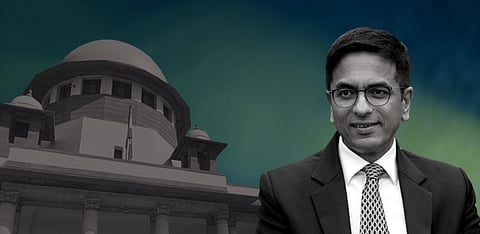

In his letter, Advocate-on-Record Shashank Singh also questioned the engagement of law clerks from outside the pool of law clerks created pursuant to the all-India examination held for this purpose.
—-
AN advocate practising at the Supreme Court of India, has written to the Chief Justice of India (CJI) to give an equal level playing field to people coming from socially and educationally weaker and disadvantaged groups, in the appointments of Law Clerk-Cum-Research Assistant (LCRA) with the judges of the Supreme Court.
Shashank Singh, who is an Advocate-on-Record, says that although the stipend to LCRA is being made under the head 'Salaries' from the budgetary allocation of the Supreme Court, which is charged to the Consolidated Fund of India, there is no affirmative action in favour of disadvantaged groups, that is, person with disabilities, transgender persons, denotified Tribes, etc.
The Supreme Court engages law clerks by way of an all-India test to this effect under a scheme and guidelines approved by the CJI. Clause 4 of the scheme states that the CJI and each judge shall be entitled to have services of a maximum of four law clerks, of whom atleast the first law clerk shall necessarily be from the approved panel and, if any judge so desires, the other three law clerks can be engaged as candidates of choice subject to the condition that the candidates otherwise fulfil the minimum qualification requirements/conditions.
In his letter, Singh also questioned the engagement of law clerks from outside the pool of law clerks created pursuant to the examination. Referring to the response he received under the Right to Information Act, Singh said that as on December 9, 2022, there were in total 98 law clerks engaged with judges of the Supreme Court, out of which, only three had been taken from a pool created under clause 4 of the revised scheme of 2019.
Singh argues that the panel is prepared after a rigorous process of a written examination and an interview to determine the suitability and capability of students to be empanelled and engaged as law clerks with the judges of the court and, hence, not giving them an opportunity to work and learn under the guidance of judges, and extending the said opportunity to students, who did not even participate in the process, is opposed to the doctrine of fairness in the process.
"The students who may have participated in the process obviously would be looking forward to being guided and trained under the aegis of the Hon'ble Chief Justice of India and his companion Judges of the Supreme Court of India, and thus, denial of opportunity is also opposed to the principle of legimate expectation.", the letter states.
Singh has thus urged the CJI to look into the process of the engagement of LCRAs to ensure fairness in the selection process.